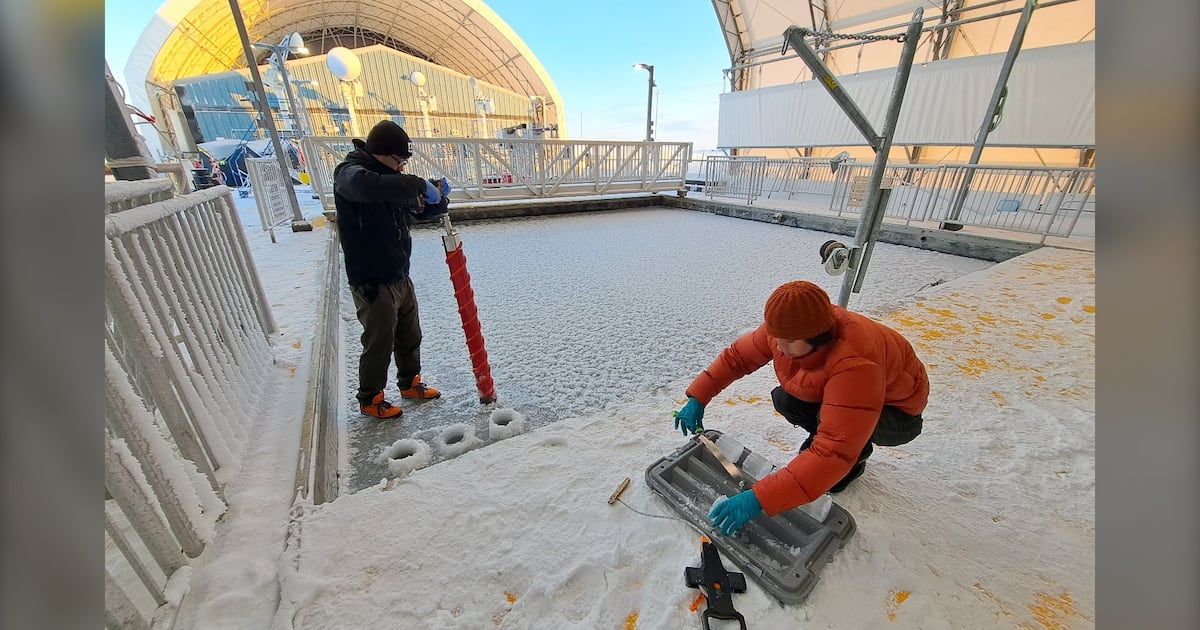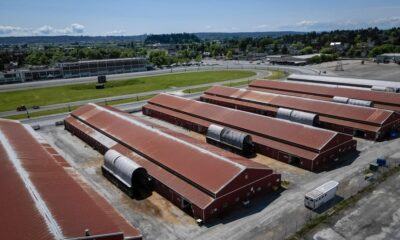Science
Manitoba Marine Research Facility Marks First Year of Breakthroughs

The Churchill Marine Observatory (CMO) in Manitoba is celebrating its first anniversary, marking a significant milestone in Arctic marine research. Officially opened on August 27, 2024, the facility has been at the forefront of advancing knowledge about the Arctic environment and its complex socioeconomic implications.
Dr. Feiyue Wang, the project lead at the University of Manitoba’s CMO, emphasized the facility’s role in enhancing Manitoba’s reputation in marine research. “The CMO really put Manitoba on the map of marine research,” he stated. The approximately $45 million facility allows for diverse studies by drawing seawater from both the Hudson Bay and the Churchill River, providing critical data as these environments undergo rapid changes.
Research Focus and Capabilities
The CMO is uniquely equipped to conduct experimental studies, enabling researchers to explore various scenarios affecting the Hudson Bay ecosystem. Dr. Wang, trained in aquatic chemistry, noted that the facility plays a pivotal role in risk reduction and mitigation strategies, particularly regarding oil spills. “We could actually test different scenarios and start to gain the knowledge to prepare the region,” he explained.
In addition to oil spill research, the CMO facilitates studies on freshwater influences on marine ecosystems. The facility features sensor arrays molded to the bottom of the Churchill River and Hudson Bay, which allow for comprehensive monitoring of both physical and biological water properties. A dedicated research vessel, the William Kennedy, enhances the mobility needed for effective sampling and monitoring.
Ongoing Research and Future Directions
While many projects are still in progress, the CMO has already supported three major research initiatives from November 2024 to February 2025. One of these studies examines the early stages of thin ice formation in collaboration with researchers from Denmark. Another project investigates whether natural microorganisms can degrade oil in ice-covered waters, a critical factor in oil spill response strategies.
Dr. Wang mentioned that the data from these studies is currently being analyzed, with plans for further research this winter. He expressed a strong desire for greater involvement from Indigenous researchers and community members, highlighting the importance of local knowledge in Arctic research. “Folks who live there, who call that region home, are the ones who are going to be more invested in it,” he said. While some community participation has been integrated, Wang aims to enhance this aspect in the CMO’s future research direction.
The CMO’s first year has set a solid foundation for ongoing and future studies, with its innovative approach contributing significantly to our understanding of the Arctic’s marine environments. As the facility continues to evolve, its commitment to community engagement and scientific excellence positions it as a leader in Arctic research.
-

 Science1 week ago
Science1 week agoMicrosoft Confirms U.S. Law Overrules Canadian Data Sovereignty
-

 Technology1 week ago
Technology1 week agoGoogle Pixel 10 Pro Fold Specs Unveiled Ahead of Launch
-

 Technology1 week ago
Technology1 week agoWorld of Warcraft Players Buzz Over 19-Quest Bee Challenge
-

 Science1 week ago
Science1 week agoXi Labs Innovates with New AI Operating System Set for 2025 Launch
-

 Science5 days ago
Science5 days agoChina’s Wukong Spacesuit Sets New Standard for AI in Space
-

 Science1 week ago
Science1 week agoInfrastructure Overhaul Drives AI Integration at JPMorgan Chase
-

 Technology1 week ago
Technology1 week agoHumanoid Robots Compete in Hilarious Debut Games in Beijing
-

 Top Stories1 week ago
Top Stories1 week agoSurrey Ends Horse Racing at Fraser Downs for Major Redevelopment
-

 Health5 days ago
Health5 days agoRideau LRT Station Closed Following Fatal Cardiac Incident
-

 Technology1 week ago
Technology1 week agoNew IDR01 Smart Ring Offers Advanced Sports Tracking for $169
-

 Technology1 week ago
Technology1 week agoFuture Entertainment Launches DDoD with Gameplay Trailer Showcase
-

 Technology1 week ago
Technology1 week agoGlobal Launch of Ragnarok M: Classic Set for September 3, 2025
-

 Science1 week ago
Science1 week agoNew Precision Approach to Treating Depression Tailors Care to Patients
-

 Technology1 week ago
Technology1 week agoInnovative 140W GaN Travel Adapter Combines Power and Convenience
-

 Business1 week ago
Business1 week agoNew Estimates Reveal ChatGPT-5 Energy Use Could Soar
-

 Lifestyle5 days ago
Lifestyle5 days agoVancouver’s Mini Mini Market Showcases Young Creatives
-

 Health1 week ago
Health1 week agoGiant Boba and Unique Treats Take Center Stage at Ottawa’s Newest Bubble Tea Shop
-

 Business1 week ago
Business1 week agoSimons Plans Toronto Expansion as Retail Sector Shows Resilience
-

 Business1 week ago
Business1 week agoUkraine Strikes Lukoil Refinery, Halting Operations Amid Conflict
-

 Lifestyle1 week ago
Lifestyle1 week agoEleven Madison Park to Reinstate Meat After Vegan Experiment
-

 Lifestyle4 days ago
Lifestyle4 days agoOntario Woman Wins $100,000 Lottery Prize from Brother’s Gift
-

 Technology1 week ago
Technology1 week agoDiscover the Relaxing Charm of Tiny Bookshop: A Cozy Gaming Escape
-

 Technology5 days ago
Technology5 days agoApple Shifts iPhone 18 Launch to Early 2027, Reports Indicate
-

 Technology1 week ago
Technology1 week agoBorderlands 4 Promises Massive Changes with 30 Billion Guns










